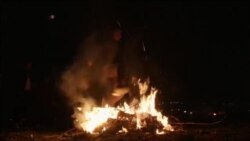ຊາວອີຣ່ານ ພາການຈູດກອງໄຟ ຈູດບັ້ງໄຟດອກ ແລະປ່ອຍ
ໂຄມໄຟຂຶ້ນສູ່ທ້ອງຟ້າໃນຄຳ່ຄືນຂອງວັນອັງຄານວານນີ້ເພື່ອ
ສະຫລອງ “ບຸນໄຟ” ຊຶ່ງເປັນປະເພນີທີ່ມີມາເກືອບ 4000 ປີ
ຂອງຊາວເປີເຊຍ ທີ່ໄດ້ຖືກຫ້າມໂດຍພວກຜູ້ນຳສາສະໜາຫົວ
ແຂງກະດ້າງນັ້ນ.
ການສະຫລອງປະຈຳປີດັ່ງກ່າວ ໄດ້ມີຂຶ້ນຢ່າງໜ້ອຍ 1700 ປີ ກ່ອນຄຣິດຕະສັກກະລາດ
ແລະພົວພັນກັບລັດທິ Zoroastrianism.
ບຸນດັ່ງກ່າວແມ່ນມີຂຶ້ນກ່ອນວັນ Nuwruz ຊຶ່ງເປັນວັນປີໃໝ່ຂອງຊາວເປີເຊຍ ທີ່ຈະສະ
ຫລອງກັນໃນວັນທີ 21 ເດືອນມີນານີ້.
ຢູ່ໃນສວນສາທາລະນະແຫ່ງນຶ່ງ ໃນນະຄອນ Tehran ບັນດາຊາຍໜຸ່ມ ພາກັນເຕັ້ນຂ້າມ
ກອງໄຟ ຈູດບັ້ງໄຟດອກ ແລະຟ້ອນລຳກັບດົນຕີ ທີ່ດັງກ້ອງອອກມາຈາກເຄື່ອງຫລິ້ນ
stereo ຂອງລົດ.
ຕຳຫລວດ ໄດ້ເຕືອນຜູ້ຄົນ ບໍ່ໃຫ້ໂຮມຊຸມນຸມກັນ ຢູ່ຕາມຖະໜົນຫົນທາງ ແລະຈະຕຸລັດ
ຕ່າງໆ ແຕ່ກໍບໍ່ໄດ້ດຳເນີນການໃດໆເພື່ອຂັບໄລ່ພວກທີ່ໄປສະຫລອງ.
ນັບແຕ່ການປະຕິວັດສາສະໜາອິສລາມໃນປີ 1979 ເປັນຕົ້ນມາ ພວກຫົວແຂງກະດ້າງ
ໄດ້ຫ້າມ ບໍ່ໃຫ້ສະຫລອງບຸນດັ່ງກ່າວ ໂດຍໃຫ້ຄວາມເຫັນວ່າ ເປັນບຸນທີ່ພົວພັນກັບພວກ
ນອກສາສະໜາ.
Iranians lit bonfires, set off fireworks and sent lanterns floating into the night sky on Tuesday to celebrate the "Festival of Fire," a nearly 4,000-year-old Persian tradition that has been discouraged by religious hardliners.
The annual ritual dates back to at least 1700 BC and is linked to Zoroastrianism.
It comes days before Nowruz, the Persian new year, which will be rung in on March 21.
In a park in Tehran, young men leapt over a bonfire, set off fireworks and danced to music blasting from a car stereo.
Police had warned people to stay away from main streets and squares but did not move to disperse the revellers.
Since the 1979 Islamic Revolution, hardliners have discouraged celebrations of the festival, viewing it as a pagan holdover.





